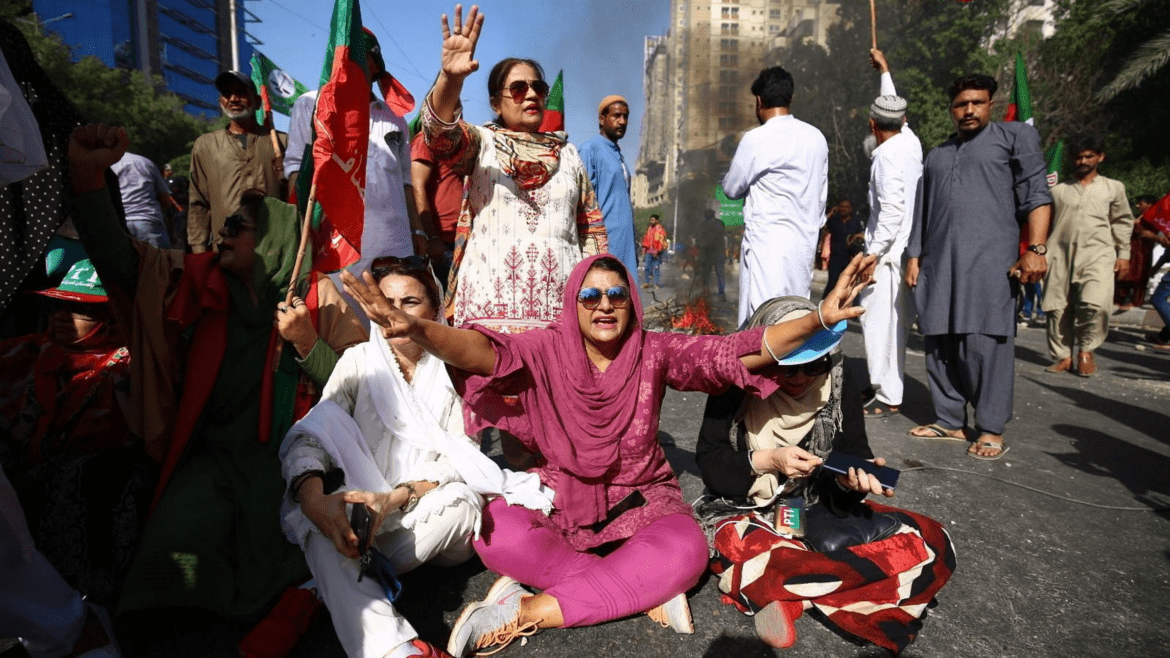AI Generated Summary
- In a surprising turn of events, the arrest of former Pakistan Prime Minister Imran Khan on Tuesday has set the stage for widespread unrest, resulting in chaos across the country.
- Crowds have gathered outside the Pakistan embassy in the United Kingdom in protest at the arrest of the country’s former Prime Minister Imran Khan.
- Supporters of Khan, the chief of Pakistan Tehreek-e-Insaf (PTI), took to the streets in droves, igniting a wave of rioting and arson that has further destabilized the already tense political climate.
In a surprising turn of events, the arrest of former Pakistan Prime Minister Imran Khan on Tuesday has set the stage for widespread unrest, resulting in chaos across the country. Supporters of Khan, the chief of Pakistan Tehreek-e-Insaf (PTI), took to the streets in droves, igniting a wave of rioting and arson that has further destabilized the already tense political climate.
Imran Khan’s arrest was upheld as ‘legal’ by the Islamabad High Court. The decision provoked a whirlwind of reactions from Khan’s loyal supporters, who vehemently disagreed with the court’s judgment. The volatile situation escalated rapidly, with large-scale civil disobedience playing out in real time as Khan’s supporters clashed with law enforcement agencies.
Gunshots echoed through the streets in several parts of the country, signalling a sharp escalation in the crisis. Smoke plumes from various sites painted a grim picture against the country’s skyline, an ominous sign of the disorder that had taken hold. These images captured the intense response from Khan’s supporters, who set numerous places ablaze in the wake of the former Prime Minister’s arrest.
In an unprecedented display of public ire, protesters stormed the military headquarters in Rawalpindi. The main entrance of the campus fell victim to the wrath of Khan’s supporters, culminating in its destruction.
This incident marks a significant departure from the usual responses to political happenings. It underscores the deep-seated support for Khan and the widespread disbelief and anger at his arrest among his followers. The storming of such a high-security, symbolic establishment is a powerful testament to the intensity of public sentiment.
As the dust settles on these explosive events, Pakistan’s law and order situation remains in shambles. The PTI chief’s arrest has exacerbated tensions within the country, leading to widespread protests and outbreaks of violence.
Authorities are grappling with the daunting task of restoring peace and order amidst the turmoil. The arrest of a political figure of Khan’s stature has not only sparked controversy but has also ignited a crisis of governance.
Crowds have gathered outside the Pakistan embassy in the United Kingdom in protest at the arrest of the country’s former Prime Minister Imran Khan. One protester told the BBC: “What else can we do? What else is there left in Pakistan? We have never said a word against the army, I wish we had.
The future of Pakistan now hangs in the balance. The government’s ability to control the situation and quell the unrest will define the country’s trajectory in the coming days. Amidst this chaos, one thing is clear: the arrest of former Prime Minister Imran Khan has plunged Pakistan into a tumultuous period of uncertainty and unrest.
With the situation unfolding rapidly, the world watches with bated breath as Pakistan navigates this critical juncture in its history. The resolution of this crisis will be an important gauge of the strength and resilience of the country’s democratic institutions. The nation now stands at a crossroads, its path forward uncertain but critically important for its future stability.




